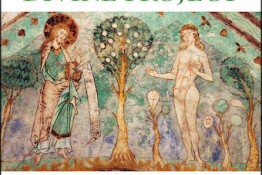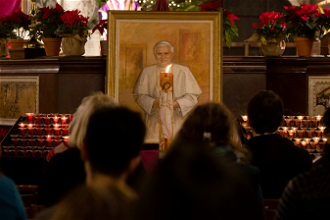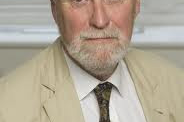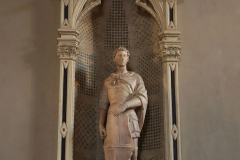Pope Benedict: 'our faith is not born from myth but from an encounter with the Risen One'
Pope Benedict focused on Saint Paul during his General Audience in St Peter's Square on Wednesday, saying: "Our faith is not born from a myth or an idea, but from an encounter with the Risen One, in the life of the Church."
In his catechesis, the Pope focussed mainly on Paul's relationship with the Apostles, explaining that "these relationships were always marked by profound respect and by the frankness that in Paul stemmed from the defense of the truth of the Gospel. Although he was practically a contemporary of Jesus of Nazareth, he never had the opportunity to meet him during his public life. Because of this, after the dazzling light on the road to Damascus, he saw the need to consult the first disciples of the Master, who had been chosen by [Christ] to take the Gospel to the ends of the earth."
Benedict XVI then mentioned how Paul himself, in the Letter to the Galatians, "Paul elaborates an important report on the contacts maintained with some of the Twelve," above all with Peter, then James and John, who Paul sees as the "pillars" of the Church. As to the information that Paul received on Jesus in the three years following his encounter with Him on the road to Damascus, the Holy Father highlighted the fact that Paul insists "on fidelity to what he himself has received and transmits faithfully to the new Christians. They are elements and concern the Eucharist and the Resurrection... the words of Jesus in the Last Supper really are for Paul the center of the life of the Church. The Church is built from this center, being in this way herself. In addition to this Eucharistic center, from which the Church is always reborn -- also for all Paul's theology, for all his thought -- these words have a notable impact on Paul's personal relationship with Jesus. On one hand, they attest that the Eucharist illumines the curse of the cross, changing it into a blessing , and on the other, they explain the breadth of the very death and resurrection of Jesus." In the other text of the Resurrection (1 Cor 15:3-5) as well, Paul "underlines the gift that Jesus has made of himself to the Father, to deliver us from sin and death. From this gift of himself, Paul draws the most moving and fascinating expressions of our relationship with Christ."
The Pope later mentioned that in the original transmission by word of mouth, the term "has risen" instead of "rose" (which would have been more logical), to emphasize the fact "that Christ's resurrection affects up to the present the existence of believers: We can translate it as 'has risen and continues to be alive' in the Eucharist and in the Church."
The enumeration of the Risen One's apparitions to Cephas, to the Twelve, to more than 500 brethren, and to James closes with the reference to the personal apparition received by Paul on the road to Damascus: "Last of all, as to one untimely born, he appeared also to me" (1 Corinthians 15:8). The Pope explained that "because he had persecuted the Church of God, he expresses in this confession his unworthiness to be considered an apostle, at the same level as those who preceded him: but God's grace has not been in vain in him. Hence, the boastful affirmation of divine grace unites Paul with the first witnesses of Christ's resurrection. 'Whether then it was I or they, so we preach and so you have believed' (1 Corinthians 15:11). The identity and unity of the proclamation of the Gospel is important: both they and I preach the same faith, the same Gospel of Jesus Christ dead and risen who gives himself in the most holy Eucharist."
In concluding his catechesis, the Holy Father focused on the importance that Paul gives to the living Tradition of the Church, which she transmits to her communities, "demonstrates how mistaken is the view of those who attribute to Paul the invention of Christianity: Before proclaiming the Gospel of Jesus Christ, he encountered him on the road to Damascus, and met him in the Church, observing his life in the Twelve, and in those who had followed him on the roads of Galilee... The more we try to follow in the footsteps of Jesus of Nazareth on the roads of Galilee, so much the more will we understand that he has taken charge of our humanity, sharing in everything except sin. Our faith is not born from a myth or an idea, but from an encounter with the Risen One, in the life of the Church."
At the end of the audience, in greeting the Italian-speaking pilgrims present, the Pope gave a special salutation to the youth from the "Rondine-Cittadella della Pace" Association of Arezzo, among whom were various youth from the Caucasus region. He told them: "Dear friends, it is my hope that your meeting may contribute to affirming a culture of peaceful coexistence among peoples and to promoting understanding and reconciliation."
Source: Fides





















